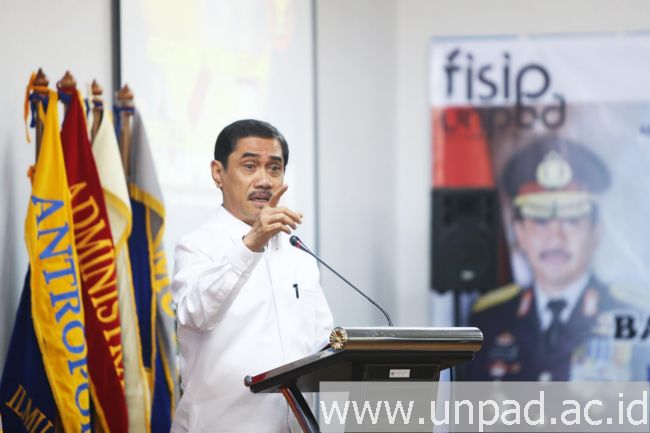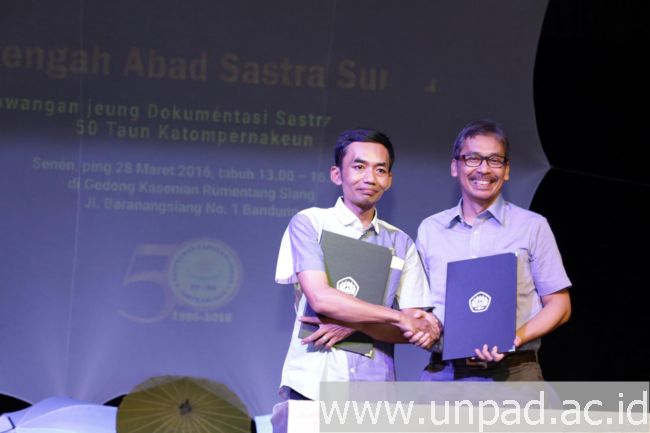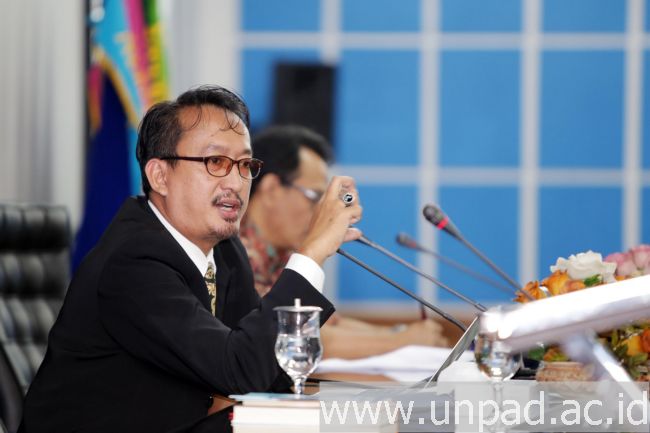[Unpad.ac.id, 16/11/2016] Head of the National Counter-Terrorism Bureau (BNPT) RI Commissioner General Pol. Drs. Suhardi Alius, M.H., invited students to be aware of the various dimensions that could divide the unity of the nation. According Suhardi, the dimensions are the effects of globalization and the development of nation building.

“The construction of the nation gave birth to turbulence which can produce two sides, the good and the bad. Bad sides then will erode nationalism,” said Suhardi during the public lecture entitled” Resonance Nationality and Preventing Radicalism in the Yourh Environment and Students” at Seminar Room, Building A Campus FISIP Jatinangor, Wednesday (16/11).
The public lecture moderated by Professor of Social and Political Science, Prof. Dr. Obsatar Sinaga, M.Sc., was attended by students of FISIP Unpad. Also present were Director of Governance and Public Communication Unpad Dr. Soni A. Nulhaqim, S. Sos., M.Sc., Dean of the Faculty of Social Padjadjaran University Dr. R. Widya Setiabudi S, M.T., M.Sc., as well as a number of leaders and lecturers in Unpad FISIP.
Suhardi said that the spirit of Youth Pledge momentum in 1928 that brought all the diversity in Indonesia together has been torn today. The spirit of tolerance was said to be virtually disappeared with the number of cases of intolerance in Indonesia. This also causes for the values of Pancasila be reduced.
By reduction of Pancasila values today, the former police chief of West Java is considered that something wrong was happening in Indonesia. “If this is not treated, there is not necessarily a guarantee there would be this Republic in the next 100 years,” said Suhardi.
Furthermore Suhardi said that various dimensions appeared to be aware of all sectors, including the dimensions of geography, demographics, natural resources, to the sector ideological, political, economic, social, cultural, and defense and security.
He also highlighted the rise of understanding of radicalization on the side of ideology. This understanding is a threat crucial for the country. The main target of this is the spread of Indonesian young generation.
Rapid flow of information on the Internet has impacted on the rapid spread of radicalism in Indonesia. Suhardi said, today many radical information are easily accessible by all people, including children.
In front of the students, Suhardi also cited various surveys related to the spread of radicalism in Indonesia. One of Wahid Foundation survey in 2016 reported that about 72% of Indonesian people rejected radicalism. In addition, approximately 7.7% was reported participating in radicalism, and 0.4% said that they had engaged in activities radicalism.
The survey respondents targeted the 150 million Muslim in Indonesia. If calculated, the value of 7.7%, equivalent to 11.5 million people. While 0.4% is equivalent to 600 thousand inhabitants.
Therefore, the expulsion of this understanding cannot be done by BNPT alone. Suhardi said the works was not only completed in the downstream sector, but also in the upstream sector. Government through the relevant ministries should be appraised and be earnest in addressing the spread of radicalism.
In the sector of the Ministry of Research and Higher Education, said Suhardi, alleviation of radicalization is not just targeted at students, but also involve an element of lecturers. In addition to the integration of educational Counter Radicalisation and strengthening national awareness in the curriculum of higher education, faculty must be given training and guidance on the implementation of the educational Counter Radicalism.
“Further, the Rector and Lecturers should care and provide guidance to the entire student activities,” said Suhardi. *
Reported by Arief Maulana / eh


